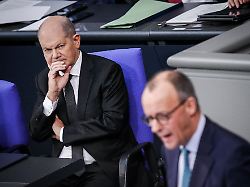Economic letter to the Chancellor
Merz explains to Scholz the way out of the recession
February 10, 2024, 12:31 p.m
Listen to article
This audio version was artificially generated. More info | Send feedback
It didn’t work well in direct conversation, maybe it will work in writing: CDU leader Merz proposes twelve measures to Chancellor Scholz in a letter that should lead Germany out of the economic crisis. Writing contains carrots and sticks.
The leadership of the Union parliamentary group has submitted a letter to Chancellor Olaf Scholz with an immediate program to lead Germany out of recession. The twelve short-term measures listed by CDU parliamentary group leader Friedrich Merz and CSU regional group leader Alexander Dobrindt in the letter dated Friday include a permanent reduction in electricity tax. The two politicians are also in favor of imposing stronger sanctions on those receiving civil benefit if they refuse to accept work. They also want to change the law to ensure that a business project is considered approved if the responsible authority has not made a decision on it after three months.
Subsidies are not part of the proposals. From the Union’s perspective, however, these are necessary in addition to medium and long-term measures in order to strengthen German competitiveness in the long term. Instead, Merz and Dobrindt suggest limiting social security contributions again to a maximum of 40 percent of gross wages, giving tax advantages to overtime for full-time employees and making the first 2,000 euros of income per year tax-free for pensioners. They are also calling for a “burden moratorium” that is intended to ensure that no additional bureaucracy arises for businesses and citizens until the end of 2025.
In the letter, Merz and Dobrindt also suggest a noticeable reduction in the burden on companies. For example, they bring into play a reduction in taxes on corporate profits to 25 percent that remain in the company. “Our country is threatened with a loss of prosperity on an unprecedented scale,” warn the two politicians. They want to bring their package of measures to the Bundestag for discussion in the coming week of the meeting.
Sensitive like a mimosa
In order to lead the German economy out of the crisis, Economics Minister Robert Habeck and Finance Minister Christian Lindner also announced relief for companies. However, they still have different ideas about what exactly this relief should look like. Habeck brought into play a billion-dollar, debt-financed special fund as well as the possibility of creating tax credits and tax depreciation options. Lindner rejects more debt.
In September, Scholz proposed a pact to the states and the “democratic opposition” to modernize Germany, which should also cover the issue of migration. At the time, the Chancellor expressly included CDU leader Merz in his offer. As a result, there were two meetings between the two politicians, one of which Dobrindt also took part in.
After the federal and state governments agreed on a package of measures to combat irregular migration, Merz stopped working on a “Germany Pact” in November and said: “I don’t see any willingness on the part of the Chancellor at the moment to substantially continue the discussions with us.” Scholz later accused Merz of being as sensitive as a mimosa.
